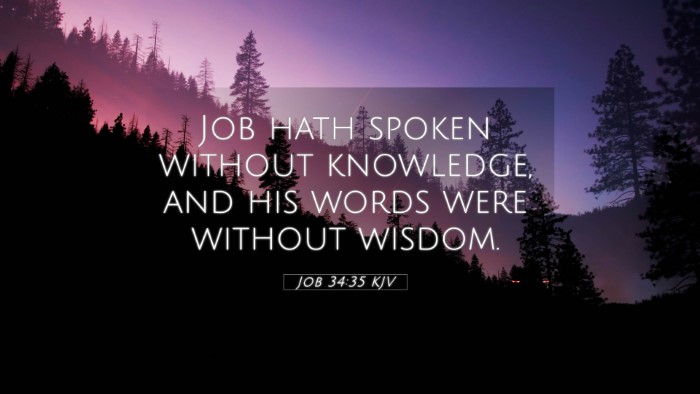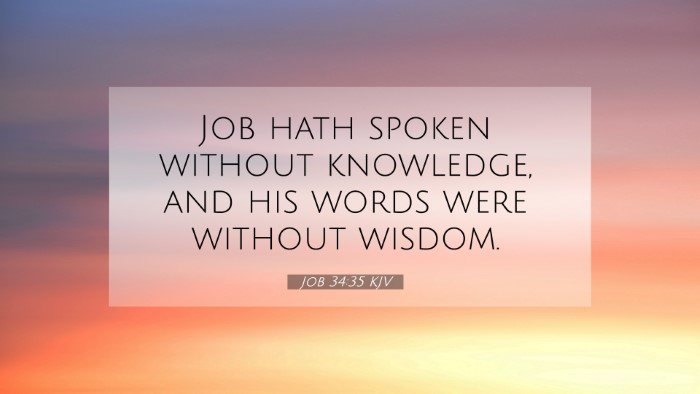Understanding Job 34:35
Verse: Job 34:35 states: “Job hath spoken without knowledge, and his words were without wisdom.”
This statement comes during a critical moment in the dialogue between Job and his friends. In this verse, Elihu rebukes Job for his understanding of God's justice. Let us explore the meaning and implications of this verse through a synthesis of insights from notable public domain commentaries, including those by Matthew Henry, Albert Barnes, and Adam Clarke.
Commentary Insights
-
Matthew Henry:
Henry emphasizes Job's reaction during his suffering, indicating that Job's expressions and complaints reflect a misunderstanding of divine justice. He argues that Job's insistence on his integrity, despite his afflictions, showcases a lack of complete knowledge of God's purposes. Henry suggests that our understanding of God's ways is often limited, and we must recognize that God’s wisdom surpasses human understanding.
-
Albert Barnes:
Barnes highlights Elihu's perspective, which distinguishes between righteous suffering and the implications of speaking against God's plans. He interprets this verse as a caution against presumption, noting that while Job aimed to defend his character, he unwittingly spoke carelessly. Barnes calls attention to the importance of humility in our discourse regarding God’s will and the universe’s operation.
-
Adam Clarke:
Clarke expands on the idea that knowledge is essential to wisdom. He remarks that Job’s claims lacked a comprehensive understanding of the divine tapestry woven throughout creation. Therefore, Job’s assertions lacked substance and depth, as they were grounded in his limited experience rather than divine revelation. Clarke suggests that true wisdom comes from understanding God’s actions and character fully.
Thematic Connections
Job 34:35 encourages readers to examine their understanding of God’s character and the nature of His justice. This self-examination leads to a broader exploration of scripture that ties into themes of divine wisdom and human understanding. Below are some related themes and verses that engage in inter-biblical dialogue with this passage:
Relevant Cross References
- Job 28:12-13: “But where shall wisdom be found? And where is the place of understanding?” - This verse captures the essence of seeking divine wisdom, crucial to understanding God’s justice.
- Proverbs 3:5-6: “Trust in the Lord with all thine heart; and lean not unto thine own understanding.” - This verse warns against relying solely on personal insight, echoing Job's struggles.
- Isaiah 55:8-9: “For my thoughts are not your thoughts, neither are your ways my ways, saith the Lord.” - It underscores the disparity between human reasoning and divine priorities, much like Elihu’s observations in Job.
- James 1:5: “If any of you lack wisdom, let him ask of God, that giveth to all men liberally.” - This verse aligns with the idea that we must seek divine wisdom rather than presuming to understand God's ways.
- Psalm 147:5: “Great is our Lord, and of great power: his understanding is infinite.” - This emphasizes God's infinite wisdom and power, contrasting with human limitations.
- Job 9:12: “If I were to say, ‘I am blameless,’ it would not matter, for I cannot contend with God.” - Job touches upon the futility of claiming righteousness apart from God's perspective.
- Romans 11:33: “O the depth of the riches both of the wisdom and knowledge of God! How unsearchable are his judgments, and his ways past finding out!” - A direct affirmation of God's inscrutable knowledge and the need for humility in human understanding.
Conclusion
Job 34:35 serves as a profound reminder of the limitations inherent in human wisdom and perspective when confronting divine issues. As believers, we are encouraged to engage in comparative Bible verse analysis, drawing connections that deepen our understanding of God's character and our place within His creation. The act of cross-referencing Biblical texts not only enriches our personal study but also illuminates the intricate web of divine wisdom threaded throughout scripture.
Exploring the Tools for Bible Study
To further delve into scriptures and uncover thematic Bible verse connections, utilizing a Bible concordance or a Bible cross-reference guide can enhance your study. Here are recommended methods to improve your Bible study:
- Break down themes in scripture by utilizing a cross-reference Bible study approach to identify similar messages throughout the Bible.
- Investigate Bible chain references, which outline connections between pivotal verses and themes.
- Engage in cross-referencing Bible study methods that allow for a holistic view of scriptural themes, fostering deeper insights into God's nature.
By focusing on these practices, readers can uncover profound insights and enrich their understanding of challenging verses such as Job 34:35, while also mapping out connections between various scriptures.







